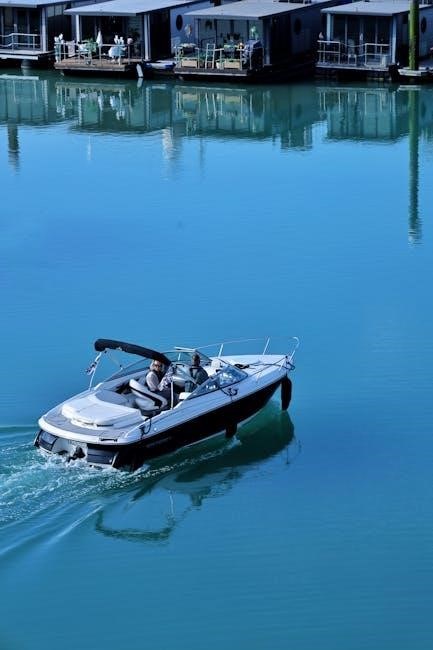The Bahamas offers crystal-clear waters‚ vibrant coral reefs‚ and a rich cultural heritage‚ making it a premier destination for sailors and cruisers worldwide. With its stunning landscapes‚ diverse marine life‚ and warm hospitality‚ the Bahamas provides endless opportunities for exploration and relaxation. From serene anchorages to bustling ports‚ this archipelago is a must-visit for any cruising enthusiast.
Its strategic location in the Caribbean‚ combined with its well-developed marinas and welcoming atmosphere‚ ensures a memorable experience for all. Whether you’re seeking adventure‚ tranquility‚ or cultural immersion‚ the Bahamas delivers unparalleled cruising experiences.
1.1 Overview of the Bahamas Archipelago
The Bahamas archipelago spans over 3‚000 cays‚ islands‚ and islets‚ offering a diverse cruising landscape. Located southeast of Florida‚ it stretches across the Atlantic and Caribbean‚ providing a strategic gateway for sailors. The archipelago is renowned for its turquoise waters‚ vibrant coral reefs‚ and white sandy beaches‚ creating a paradise for explorers and cruisers alike.
From the bustling ports of Nassau to the serene anchorages of the Out Islands‚ the Bahamas offers a unique blend of culture‚ nature‚ and adventure. Its well-developed marinas‚ safe harbors‚ and welcoming atmosphere make it a top destination for cruisers seeking unforgettable experiences in the Caribbean.
1.2 Why the Bahamas is a Popular Cruising Spot
The Bahamas’ crystal-clear waters‚ vibrant coral reefs‚ and stunning landscapes attract cruisers worldwide. Its strategic location near Florida and well-developed marinas make it easily accessible. The archipelago offers a mix of serene anchorages‚ bustling ports‚ and rich cultural experiences‚ catering to both relaxation and adventure. These factors combined create a perfect destination for cruisers seeking unforgettable experiences.
Additionally‚ the Bahamas’ warm climate‚ diverse marine life‚ and welcoming locals enhance its appeal. With countless opportunities for snorkeling‚ diving‚ and exploring‚ it remains a top choice for sailors and travelers alike‚ ensuring a memorable cruising experience.
1.3 Brief History of Cruising in the Bahamas
The Bahamas’ cruising history dates back to the Lucayan Indians and early explorers like Columbus. Its strategic location made it a maritime crossroads for trade and piracy. By the 20th century‚ it became a popular destination for American cruisers‚ drawn by its pristine waters and vibrant culture.
Today‚ the Bahamas is a cruising hub‚ blending rich history with modern amenities. Its transformation into a premier destination reflects its adaptability and enduring appeal to sailors and travelers worldwide.
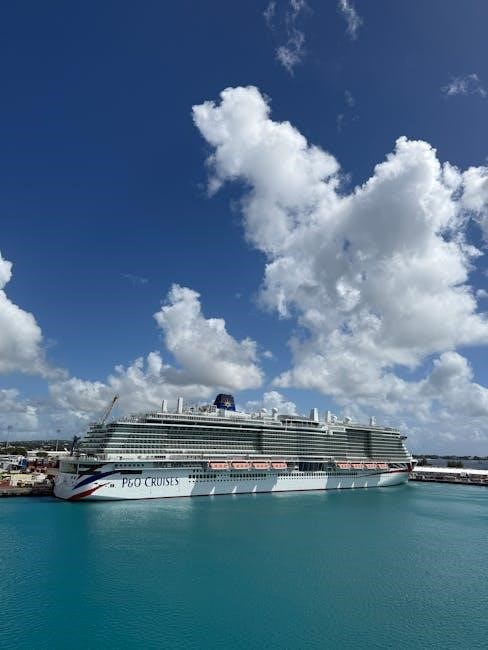
Planning Your Bahamas Cruising Trip
Planning a Bahamas cruise involves timing your trip seasonally‚ budgeting for expenses‚ securing necessary documents‚ and researching reliable itineraries to ensure a smooth and enjoyable journey.
Utilize cruising guides and charts to prepare for the adventure ahead‚ ensuring a well-organized trip tailored to your preferences and needs.
2.1 Best Time to Cruise the Bahamas
The best time to cruise the Bahamas is during the dry season‚ from December to May‚ offering pleasant weather‚ calm seas‚ and ideal conditions for sailing and snorkeling.
Summer months bring warmer temperatures but also hurricane risks‚ while the shoulder season (November and June) provides fewer crowds and lower costs‚ making it a great time for budget-conscious travelers.
2.2 Choosing the Right Itinerary
Choosing the right itinerary for your Bahamas cruise depends on your interests‚ duration‚ and experience level. Popular routes include exploring the Out Islands‚ visiting historic Nassau‚ or sailing through the Exumas. Consider the season‚ weather conditions‚ and marina availability when planning. A well-planned itinerary ensures a balanced mix of relaxation‚ adventure‚ and cultural experiences‚ tailored to your preferences.
Whether you prefer secluded beaches‚ vibrant ports‚ or snorkeling in crystal-clear waters‚ a thoughtfully designed route will maximize your cruising enjoyment and create lasting memories of the Bahamas.
2.3 Essential Documents and Requirements
Ensure you have a valid passport‚ cruising permit‚ and boat registration before entering the Bahamas. All pleasure vessels must be registered and cleared through customs. A cruising permit is mandatory for all foreign-flagged boats. Additionally‚ carry proof of insurance and be prepared to declare all onboard items to avoid delays during the clearance process.
Understanding and complying with these requirements ensures a smooth entry and hassle-free cruising experience in the Bahamas.
2;4 Budgeting for Your Bahamas Cruise
Budgeting is crucial for a stress-free Bahamas cruise. Plan for marina fees‚ fuel‚ provisions‚ and customs charges. Average marina costs range from $2 to $5 per foot nightly‚ while fuel prices vary based on location. Allocate funds for dining‚ activities‚ and incidentals; Set aside $500–$1‚000 per week for a modest cruising budget‚ adjusting based on your itinerary and preferences.
Consider provisioning costs and potential unexpected expenses to ensure a enjoyable trip without overspending.
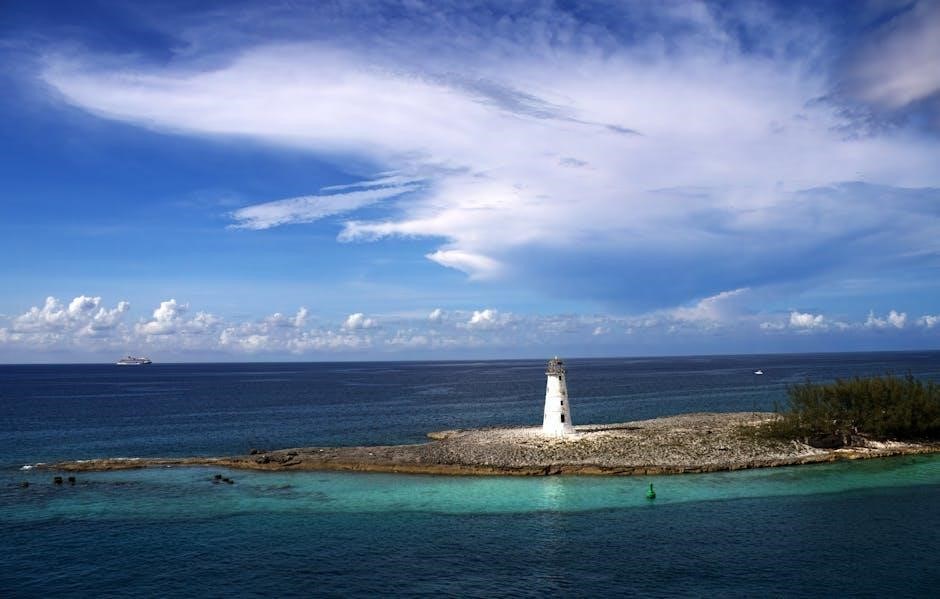
Arrival and Customs in the Bahamas
Upon arrival‚ cruisers must use the Click2Clear system and complete the Cruising Permit Module for a smooth customs process. This ensures compliance with entry requirements and documentation.
3.1 Ports of Entry and Clearance Process
The Bahamas has multiple designated ports of entry‚ including Nassau‚ Freeport‚ and Marsh Harbour‚ where cruisers must officially clear customs. The process involves declaring all onboard items and obtaining a cruising permit through the Click2Clear system. Proper documentation and adherence to regulations ensure a hassle-free entry into Bahamian waters for all voyagers.
3.2 Understanding Customs and Immigration Rules
When entering the Bahamas‚ cruisers must comply with customs and immigration rules. All onboard items‚ including food‚ alcohol‚ and firearms‚ must be declared. Prohibited items include certain plant and animal products. Foreign-flagged vessels must adhere to the Passenger Vessel Services Act (PVSA) when traveling between U.S. ports‚ ensuring legal compliance during their stay.
3.4 What to Declare and Prohibited Items
Cruisers must declare all onboard items‚ including food‚ alcohol‚ and firearms. Prohibited items include certain plant and animal products‚ illegal drugs‚ and weapons. Failure to declare goods or attempting to bring prohibited items can result in fines or confiscation. Ensure compliance with customs regulations to avoid delays or penalties during your Bahamas cruise.
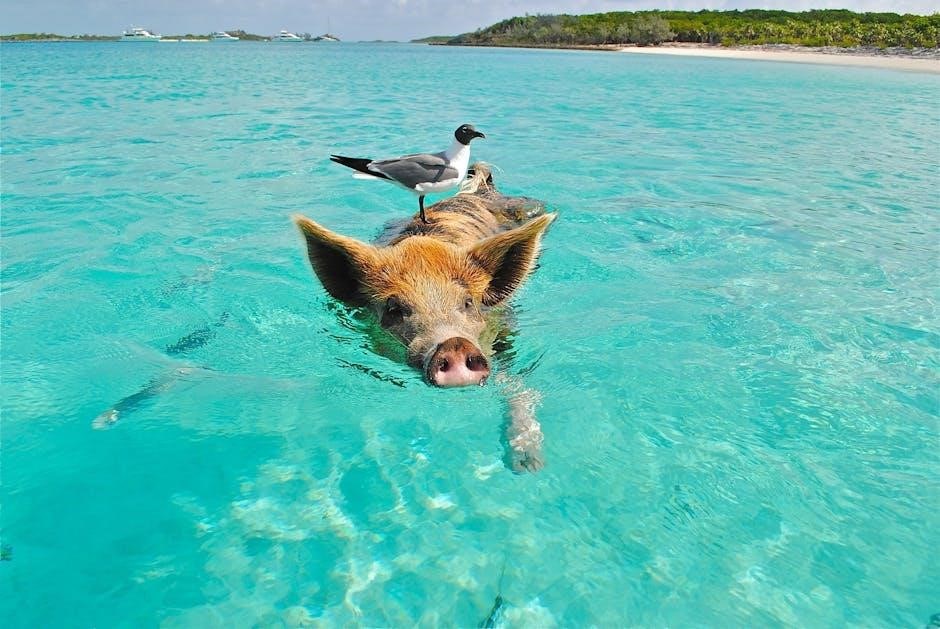
Navigating Bahamian Waters
Navigating the Bahamas requires detailed charts and GPS‚ as the crystal-clear waters hide coral reefs and shifting sands. Plan carefully to ensure safe passage through this stunning archipelago.
4.1 Charts and Maps for Safe Navigation
Navigating the Bahamas requires detailed charts and maps to avoid coral reefs and shallow waters. Use reliable charts like Navionics or C-Map‚ updated regularly. Carry physical charts as backups and ensure your GPS is accurate. The waters can be unpredictable‚ so thorough preparation is essential for safe and enjoyable cruising in the Bahamas.
4.2 Understanding Tides‚ Currents‚ and Weather
The Bahamas’ subtropical climate offers warm temperatures and high humidity year-round. Tides and currents significantly affect navigation‚ especially in shallow waters. The hurricane season‚ from June to November‚ requires careful planning to mitigate risks. Regular monitoring of weather forecasts‚ using reliable sources like NOAA‚ is essential for safe and enjoyable cruising through the islands.
4.3 Communication Tools for Cruisers
Reliable communication is vital while cruising the Bahamas. Popular tools include VHF radios for real-time updates and GPS devices for precise navigation. Apps like WhatsApp and Facebook Messenger are widely used for staying in touch with fellow cruisers. Additionally‚ many marinas offer complimentary Wi-Fi‚ ensuring connectivity during your stay.
Local SIM cards or prepaid plans provide affordable data access‚ while satellite phones are recommended for remote areas with limited coverage‚ ensuring safety and connectivity throughout your journey.
Provisions and Fuel
Stocking up on provisions and fuel is essential for a smooth Bahamas cruise. Popular spots like Nassau and Freeport offer ample supplies‚ while smaller islands provide basics. Plan ahead for fuel efficiency‚ as availability can vary. Ensure water and food storage are optimized for longer voyages between ports.
Local markets and marinas are great for fresh produce and seafood‚ enhancing your cruising experience with authentic Bahamian flavors and essentials.
5.1 Best Places to Restock Supplies
Nassau and Freeport are top spots for restocking‚ offering well-stocked markets and marinas. Smaller islands provide basics‚ but larger ports ensure variety and quality. Plan visits to these hubs to replenish groceries‚ fresh produce‚ and essentials‚ ensuring a smooth continuation of your Bahamas cruise. Don’t miss the chance to enjoy fresh seafood and local flavors during your stops.
5.2 Managing Water and Fuel Consumption
Monitor water and fuel usage closely‚ as resources can be limited in remote Bahamian islands. Plan refills at major ports like Nassau or Freeport; Conserve water by using solar showers and minimizing generator use. Carry extra fuel and water reserves‚ especially for extended trips. Efficient management ensures a smooth and enjoyable cruising experience throughout the Bahamas.
5.3 Local Cuisine and Dining Options
The Bahamas offers a flavorful blend of fresh seafood‚ tropical fruits‚ and traditional dishes like conch fritters‚ guava duff‚ and peas and rice. Dine at local eateries or upscale restaurants‚ each showcasing Bahamian cuisine. Provision your boat with fresh produce from markets or enjoy dockside dining‚ savoring the island’s culinary delights while immersing in its vibrant culture.
Anchoring and Mooring
The Bahamas offers numerous safe anchorages with clear waters and vibrant marine life. Proper anchoring techniques and respect for the environment ensure a sustainable cruising experience.
6.1 Popular Anchorages in the Bahamas
The Bahamas boasts numerous exceptional anchorages‚ such as Nassau Harbour‚ Paradise Island‚ and the Exumas. These spots offer serene environments‚ crystal-clear waters‚ and access to stunning beaches. Popular anchorages like Eleuthera and Long Island provide opportunities to explore vibrant marine life and enjoy secluded coves. Each location offers unique charm‚ catering to different preferences and vessel needs.
6.2 How to Anchor Safely in Different Conditions
Ensure safe anchoring by assessing weather‚ sea floor‚ and surrounding obstacles. Avoid coral reefs to prevent damage. Use appropriate anchor types for sand‚ grass‚ or rocky bottoms. Monitor wind and current shifts‚ adjusting your position as needed. Maintain a safe distance from other vessels and marine life. Always test the anchor’s hold before leaving it unattended.
6.3 Environmental Considerations for Anchoring
Protect the Bahamas’ fragile marine ecosystem by avoiding coral reefs and seagrass beds. Use anchors with non-toxic paint to prevent chemical contamination. Dispose of waste properly‚ taking all trash ashore. Avoid disturbing marine life‚ such as sea turtles and fish. Follow local regulations to preserve the environment and ensure sustainable cruising practices for future generations.
Marinas and Boatyards
The Bahamas’ top-rated marinas offer excellent facilities‚ including fuel docks and luxurious amenities. Local boatyards provide essential repair services‚ ensuring your vessel remains seaworthy during your cruise.
7.1 Top-Rated Marinas in the Bahamas
The Bahamas boasts world-class marinas like Atlantis Marina in Nassau and Nassau Yacht Haven‚ offering state-of-the-art facilities‚ fuel docks‚ and luxurious amenities. These marinas cater to both superyachts and smaller vessels‚ providing secure berthing‚ maintenance services‚ and access to nearby attractions. Their excellent service and strategic locations make them top choices for cruisers exploring the islands.
7.2 Services Offered by Local Boatyards
Local boatyards in the Bahamas provide a wide range of services‚ including hull maintenance‚ mechanical repairs‚ and fiberglass work. Many offer painting‚ welding‚ and electrical system upgrades‚ ensuring your vessel is seaworthy. With skilled technicians and modern facilities‚ these boatyards cater to various cruising needs‚ from routine checks to extensive overhauls‚ keeping you safe and ready for the next adventure.
7.3 Tips for Booking Marina Spaces
Booking marina spaces in the Bahamas requires planning ahead‚ especially during peak seasons. Use online platforms or contact marinas directly to reserve slips. Flexibility in dates and considering off-peak times can secure better rates. Always confirm amenities like water‚ electricity‚ and fuel availability to ensure they meet your needs.
Check reviews and ask for recommendations to find reliable and well-maintained marinas‚ ensuring a smooth and enjoyable stay.
Safety and Emergency Procedures
Understanding hurricane risks‚ accessing medical care‚ and knowing emergency protocols are crucial for safe cruising in the Bahamas. Ensure you carry reliable communication devices and stay informed about weather conditions to navigate safely and respond effectively in case of emergencies.
8.1 Understanding Hurricane Risks and Safety
The Bahamas is susceptible to hurricanes‚ typically occurring between June and November. Cruisers must monitor weather forecasts‚ have emergency plans‚ and secure safe harbors. Understanding hurricane categories and evacuation procedures is vital. Always carry reliable communication devices and stay informed through trusted weather services to ensure safety during your voyage.
8.2 Medical Care and Emergency Services
Medical facilities in the Bahamas vary‚ with better-equipped hospitals in Nassau and Freeport. Cruisers should carry comprehensive medical kits and insurance. In emergencies‚ contact the Emergency Medical Services hotline or nearby marinas for assistance. Telemedicine services are also available for remote consultations. Always have a plan for medical evacuations‚ especially when cruising remote areas.
8.3 What to Do in Case of a Boating Emergency
In a boating emergency‚ remain calm and activate your EPIRB or send a Mayday call. Ensure all passengers wear life jackets and secure loose items. Assess damage and contain water ingress if possible. Use flares or reflective devices to stay visible. Ration supplies and prepare for evacuation if necessary. Keep communication devices accessible and follow Coast Guard instructions.
Legal and Environmental Regulations
Adhering to local laws and environmental guidelines is crucial to preserve the Bahamas’ marine ecosystem. Familiarize yourself with fishing permits‚ waste disposal‚ and coral reef protections to ensure sustainable cruising practices.
9.1 Fishing and Boating Regulations
Understanding local fishing and boating regulations is essential to preserve the Bahamas’ marine ecosystem. Obtain permits for fishing‚ avoid spearfishing in protected areas‚ and refrain from touching coral reefs. Adhere to size and catch limits for seafood‚ and use environmentally safe fishing gear to minimize ecological impact. Non-compliance may result in penalties‚ so ensure you follow all guidelines carefully.
9.2 Protecting Marine Life and Coral Reefs
- Avoid touching or standing on coral reefs to prevent damage and promote their survival.
- Dispose of waste properly to prevent pollution and protect marine ecosystems.
- Refrain from feeding wildlife‚ as this disrupts their natural behavior and habitat balance.
- Respect protected marine areas and wildlife reserves to conserve biodiversity.
9.3 Waste Disposal and Environmental Best Practices
Proper waste disposal is crucial to preserve the Bahamas’ pristine environment. Use recycling programs available in major ports and dispose of trash at designated facilities. Avoid discharging hazardous waste‚ including oil and chemicals‚ into the water. Keep trash securely stored to prevent it from blowing overboard. Penalties may apply for non-compliance with environmental regulations.
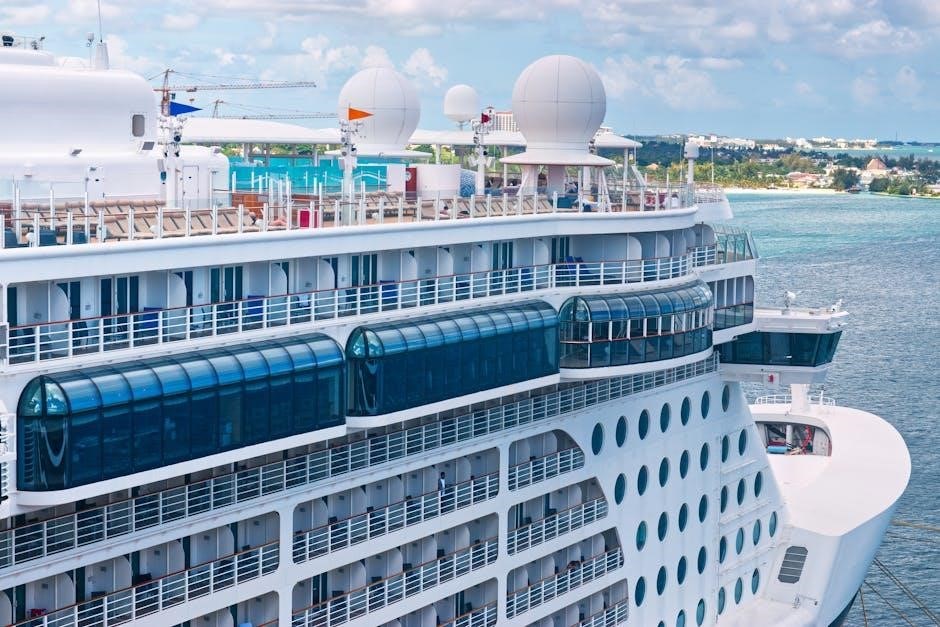
Cultural and Social Experiences
The Bahamas offers a vibrant culture rich in traditions‚ music‚ and cuisine. Engage with locals‚ attend festivals‚ and explore historical sites to immerse yourself in the island lifestyle.
10.1 Engaging with Local Bahamian Culture
Engaging with Bahamian culture offers a rich experience through festivals‚ local cuisine‚ and community interactions. Attend vibrant Junkanoo parades‚ savor dishes like conch fritters‚ and participate in traditional music and dance. Visit historical sites to learn about the islands’ heritage. Interacting with locals provides a deeper connection to the Bahamas’ warm and welcoming society‚ enhancing your cruising adventure.
